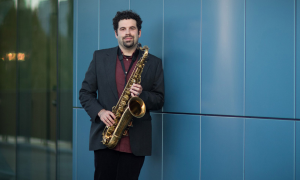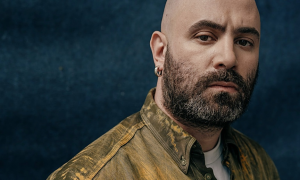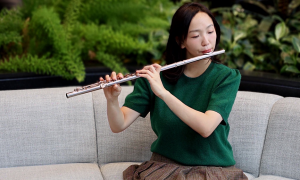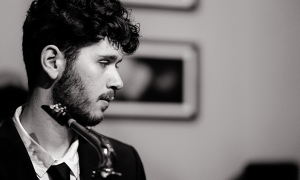Home » Jazz Articles » Take Five With... » Take Five with Gabriel Judet-Weinshel
Take Five with Gabriel Judet-Weinshel
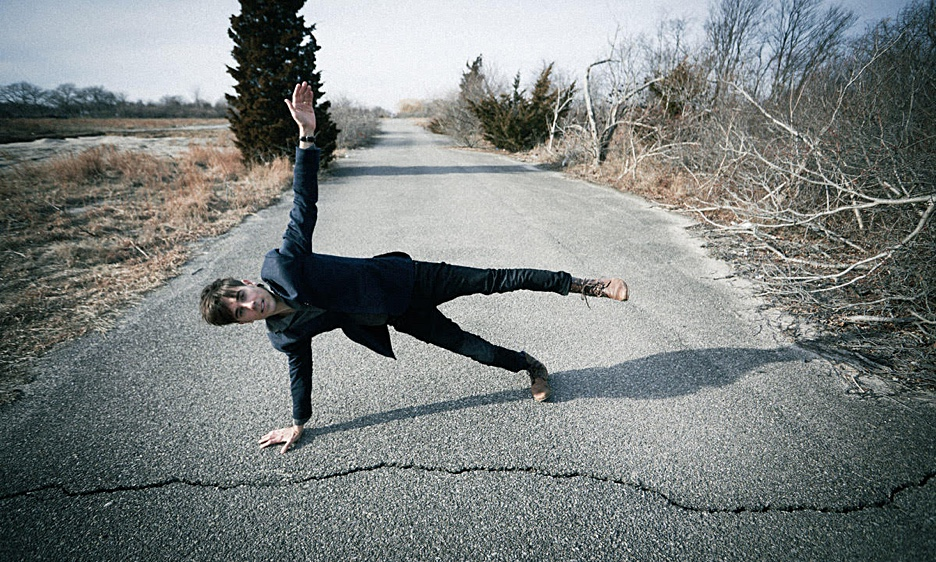
Courtesy Jesse English
Meet Gabriel Judet-Weinshel
My name is Gabriel Judet-Weinshel. I make music under the project name Unpinnable Butterflies. This is my second solo album as a songwriter, but I've also scored two feature films (the sci-fi thriller picture 7 Splinters in Time and the documentary, for Netflix, From Baghdad to Brooklyn). When I'm not making music, I make films (I also wrote and directed 7 Splinters in Time, which is findable in all the usual virtual places). Film is music; music is film.Instrument:
The only instrument I can claim with any facility is the piano. I studied jazz piano in college (and concurrently classical theory; besides a few evanescent periods with teachers as a kid and teenager, that was my first proper formal musical training). I'm a passable rhythm guitarist and can haltingly noodle my way through a solo, but from there onward it's downhill. Despite my enthusiastic accruing of instruments (which come in handy in my scoring work)—clarinet, cello, violin, rain-sodden snare drum—I'm less adept with these, and I think it's fair to say my playing is more textural than melodic (my wife calls the cello 'the donkey,' which may be unfair to donkeys).Teachers and/or influences?
As a kid in the Bay Area, I was lucky to have a wonderful violin teacher, Rebecca. I studied with her for maybe five or six years, and we worked our way through some of the Suzuki books. She was never dogmatic or overly didactic, and just gave me a sense that music was safe and fun (I was seven, eight, etc.), which is lovely, because I would venture there's always a risk at that age of dampening a kid's natural inclination towards music with too many rules, too much admonition to practice.In my teens, I briefly studied jazz guitar and producing (these were still the fairly early days of MIDI and digital recording) with Michael Powers, a great jazz guitarist in Seattle. Michael really turned me on to home recording, gave me the groundwork for how to build a track as a producer, which has been invaluable in film scoring and also in creating demos for my songwriter tunes.
Finally, and most importantly, I studied jazz with Scott Healy at Sarah Lawrence College, and Scott has been immensely formative: as a teacher, mentor, friend, and decades-long collaborator. He produced both of my songwriter records, and he is just a cynosure and a fount of knowledge and wisdom, has one of the most mind-bogglingly adept musical minds, and has been a great friend over the years.
I knew I wanted to be a musician when...
I always think of this adage where a father, who is a painting instructor, is explaining to his young daughter what he does at work: 'I teach people how to paint,' says the father. The daughter eyes him, perplexed: 'They forget?' To that end, I suppose I sort of always was making music and just never stopped. It is maybe less métier than a dialogue I've been having since before I could remember. It's a means of emotional survival, a way to find succor and meaning in a complicated world.Your sound and approach to music.
Scott once told me about Akira Kurosawa receiving the lifetime achievement award for film. 'I don't feel like I understand cinema yet,' was one of the sentiments in his pithy and humble speech. I try and make that my approach as well (not that I'm in any way equating my abilities with Kurosawa's!). Scott also told me, 'Music is a big place,' and I am continually humbled by its endless commodiousness and the breadth of other folks' abilities.Road story: Your best or worst experience
Many years ago, I was traveling as a photographer/filmmaker with Brett Dennen and his band (I shot one of Brett's early record covers, and also did a bunch of video work for him as he was starting out), and I think we were in Baltimore at a small venue, and Brett was opening for Ziggy Marley. Because of the size of the venue, everyone was sharing the same greenroom. I had stashed some camera equipment there, but there was also another photo crew (not sure who they were with, or how they got in). Perhaps thinking, 'It's Ziggy Marley, I'm sure it's cool,' (because of the stereotype/association of reggae music with marijuana use) this other crew smoked up in the greenroom—I mean, really hot-boxed the place. (I, on the other hand, for reasons that have been reinforced recently, am abstemious in the marijuana realm: not a good combo with my brain.)Meanwhile, I think Brett, his drummer, and I were out grabbing dinner, and when we returned, the place reeked of pot. The consumers of said pop had absconded, and the timing was such that I was alone in the greenroom, trying to find my gear in the haze, when Ziggy Marley himself walked in. He locked eyes with me, clearly appalled, and walked out without saying a word. From what I understood later, Marley and his colleagues had a very different relationship with marijuana—a much more religious or meditative practice with it than something one does carelessly—and certainly didn't want it casually smoked in the greenroom by a bunch of randos. I get it. It took awhile to get all this sorted, but I've rarely felt so guilty and apologetic for something I didn't do.
Favorite venue
I still have a soft spot for Pete's Candy Store in Williamsburg, Brooklyn, and also the old Living Room on Ludlow Street (before that, it was on Stanton—I even remember those days). Maybe, in a way, I'm just allowing those haunts to embody the ethos of what were early days for me, personally, in NYC, when I was seeing a lot of live music and getting a sense of the town. In the early aughts, cutting my teeth playing around town, those were dreamlike hearths—Pete's with its railway car curves and sepia tones, and the Living Room's amazing cavalcade of emerging luminaries (on a Tuesday, Norah Jones would sit in with Jesse Harris, say, or Rufus and Martha Wainwright would back up Teddy Thompson) providing an artistic bulwark to the city's onslaughts. I remember seeing Matty Charles, Gloria Deluxe, Mark Geary, and Sam Bisbee—local folks cutting their teeth. I'd watch what they did, how they interacted with a crowd, and take note.On the jazz front, one of my first experiences in New York was stumbling into Smalls (I was maybe nineteen), and just being utterly mesmerized. The intense intimacy of the space, like kids hiding in a well-appointed walk-in closet, and the marvelous dexterity of the musicianship, this (as then unknown to me) language of jazz—all that went unspoken and yet all that was communicated. It was $10 to get in, in those days, and there was no drink minimum. It felt like a mecca (and it was).
Your favorite recording in your discography and why?
Can I pick a few tracks? In the singer-songwriter work, I'm quite proud of some of the tunes with a jazz influence: 'Radio Ocean,' the title track off the new record, for its split meters (15/8 in the verse and 7/8 in the chorus) and the lyrics, and I adore Grace Kelly's sax playing and Shawn Pelton's drumming. 'Sell Me the Morning,' from the new record, is also a personal favorite, a paean to David Foster Wallace but also a missive to anyone struggling with mental illness.Earlier, off the first record, The Exile of Saint Christopher, I'm proud of the journey the tune "Old Car/New Garage" takes— it's orchestral and cinematic, but it still grooves. Then, in my movie scoring work, from the 7 Splinters in Time soundtrack, I particularly dig "Omphalos Revealed" and "Killing Father Time"—sort of panoptic tracks that give a flavor for the whole sprawling soundtrack.
What do you think is the most important thing you are contributing musically?
I just hope I'm adding some emotional honesty—in terms of my lyrics, and in terms of finding melodies that feel true and singular—to the vast place that is music. There are always cats who are going to be able to out play or out sing you. But some of the music that moves me the most is the most simple and direct. I think, as an artist, you're always, as Miles said, just trying to play like yourself.Did you know...
My primary source of income used to be as a street juggler. I still think it's the best and most honest training ground for any performer. If you can hold a crowd's attention on New York City streets, you can hold it anywhere.The first jazz album I bought was:
Not counting my parents' jazz collection (which included Keith Jarrett's trio, Dexter Gordon, Kind of Blue, and Oliver Nelson), I remember buying Wayne Shorter's Speak No Evil early on. You can obviously do a lot worse than that formidable work.Music you are listening to now:
Richard and Linda Thompson's I Want to See the Bright Lights Tonight / Harry Belafonte / Allison Russell's new record (Outside Child) / Nicholas Britell (various) / Chet Baker You Don't Know What Love Is / Aaron Lee Tasjan Up All Night / Hakon Kornstad's Aprile / Bettye Swann / Christian Lee Hudson / Ballaké Sissoko / Moses Sumney / Abdullah Ibrahim / Dua Lipa / Bonnie Prince Billy's The World's Greatest / Angel Haze's Impossible / Arthur Russell / Big Thief / Amber Mark / Salif Keita / Jay-Z's Story of O.J. / Pérotin's Viderunt Omnes.Desert Island picks:
An impossible question, and this changes every day, but off the cuff, this morning as I'm writing this: Leonard Cohen's entire oeuvre / Keith Jarrett (with Gary Peacock and Jack DeJohnette) Standards Vol.1 / Paul Simon's Rhythm of the Saints / Orchestra Baobab's Pirates Choice / Aretha Franklin's Atlantic Singles Collection / Arvo Pärt's Alina / Cesaria Evora's Cesaria.How would you describe the state of jazz today?
From what I can tell, I think the kids are all right. Just perusing YouTube, and the little bit I'm able to catch live (there's this thing afoot—I don't know if you're aware—that has made live performance much more treacherous these last 20 months), I'm continually amazed by the level of technical virtuosity and innovation happening in modern jazz.What are some of the essential requirements to keep jazz alive and growing?
With the huge caveat that I don't think I'm fully qualified to speak about this (I've only rummaged around the foothills of jazz, been awed by its heights): I think Jazz cannot be an idiom in a mausoleum, frozen in time (and thankfully, it isn't), revered and unchanging. Jazz was and is more punk rock than punk rock, and I think it's very essence is subversion. Anything that nurtures this—education, access, resources—I am for.What is in the near future?
I often can't think about anything but the climate crisis. I don't think that pre-empts jazz, or music (people will make music as long as there is a heartbeat), but, as Naomi Klein sez, 'This changes everything.'What is your greatest fear when you perform?
Resounding disapprobation from an unhappy crowd, abject failure, and putting my capo on the wrong fret.What song would you like played at your funeral?
Whatever suits the catering staff, really. (I will be hopefully sitting in in the afterlife with some heavy catz, trying to keep up.)But, in case there's disagreement, you could do worse than Abdullah Ibrahim's "Maraba Blue."
What is your favorite song to whistle or sing in the shower?
Is it weird that I don't whistle and sing in the shower? I'm usually running late and/or running to-do lists. How lamentable.If I weren't a jazz musician, I would be a:
I don't think I can rightfully call myself a jazz musician (I can hold my own through a brunch set of standards, but real cats would know the difference), but if I were neither a musician or a filmmaker, I might vie for being a painter or a poet. Barring the arts entirely, I might take up my grandfather's vocation: psychotherapist. Failing all that, street juggler has its beauty and its perks.If I could have dinner with anyone from history, who would it be and why?
How about James Baldwin? His mind was of course visionary, but so was his heart. What better balm for taking on this fractured world than to have a repast with this genius?To pair with our series' Jazz Uncorked/Jazz & Juice, what's your favorite wine, bourbon or adult beverage?
Though I wander (stumble?) happily through all spirits, I eventually (especially as fall approaches) circle back to the basic dark spirit classics: Manhattans and Boulevardiers. Any variation on a whiskey, bitter, and vermouth combination usually lands happily on my lips.Tags
Take Five With...
Gabriel Judet-Weinshel
AAJ Staff
Michael Powers
Seattle
Scott Healy
Baltimore
Norah Jones
Jesse Harris
New York City
Keith Jarrett
Dexter Gordon
Oliver Nelson
abdullah ibrahim
Gary Peacock
Jack DeJohnette
Paul Simon
Unpinnable Butterflies
About Gabriel Judet-Weinshel
Instrument: Composer / conductor
PREVIOUS / NEXT
Support All About Jazz
 All About Jazz has been a pillar of jazz since 1995, championing it as an art form and, more importantly, supporting the musicians who make it. Our enduring commitment has made "AAJ" one of the most culturally important websites of its kind, read by hundreds of thousands of fans, musicians and industry figures every month.
All About Jazz has been a pillar of jazz since 1995, championing it as an art form and, more importantly, supporting the musicians who make it. Our enduring commitment has made "AAJ" one of the most culturally important websites of its kind, read by hundreds of thousands of fans, musicians and industry figures every month.









